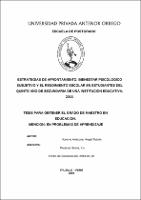Estrategias de afrontamiento, bienestar psicológico subjetivo y el rendimiento escolar en estudiantes del quinto año de secundaria de una institución educativa, 2018

Ver/
Descargar
(application/pdf: 662.1Kb)
(application/pdf: 662.1Kb)
Fecha
2019Autor(es)
Honorio Anticona, Ángel Rubén
Metadatos
Mostrar el registro completo del ítemResumen
La presente investigación tuvo como objetivo general determinar la relación de las estrategias de afrontamiento, bienestar psicológico subjetivo y el rendimiento escolar, en estudiantes del quinto año del nivel secundaria de una institución educativa nacional de Trujillo. El diseño fue de tipo correlacionales-causales, aplicado a 60 estudiantes. Se utilizaron tres instrumentos, Escalas de Afrontamiento para Adolescentes (1993), la escala de bienestar psicológico de Sánchez–Cánovas (2007); y las actas de evaluación de los estudiantes en los dos últimos trimestres académicos (2018). Los resultados mostraron que, cinco estrategias de afrontamiento se ubicaron en un nivel muy alto y; ocho estrategias en un nivel muy bajo; de las dieciocho. En el bienestar psicológico subjetivo, el 35% se ubicaron en un nivel muy alto y el 5% en un nivel normal. En cuanto a los niveles del rendimiento escolar, en el tercer trimestre, el 53% se ubicaron en el nivel Inicio y el 5% en nivel previo al inicio. Además, existieron correlaciones altamente significativas en las estrategias de afrontamiento y bienestar psicológico subjetivo. Sin embargo, en las relaciones, estrategias de afrontamiento y rendimiento escolar; como, bienestar psicológico subjetivo y rendimiento escolar, no hubo correlación significativa. Por lo tanto, se concluye que, no existe relación entre estrategias de afrontamiento, bienestar psicológico y rendimiento escolar. The main objective of the present investigation was to determine the relationship of coping strategies, subjective psychological well-being and school performance in fifth-year students of the secondary level of a national educational institution in Trujillo. The design was correlational-causal, applied to 60 students. Three instruments were used, Coping Scales for Adolescents (1993), the scale of psychological well-being of Sánchez-Cánovas (2007); and the evaluation reports of the students in the last two academic quarters (2018). The results showed that five coping strategies were placed at a very high level and eight coping strategies at a very low level; of eighteen. In the subjective psychological well-being, 35% were located at a very high level and 5% at a normal level. Regarding the levels of school performance, in the third quarter, 53% were located at the Start level and 5% at the level prior to the start. In addition, there were highly significant correlations in coping strategies and subjective psychological well-being. However, in relationships, coping strategies and school performance; as, subjective psychological well-being and school performance, there was no significant correlation. Therefore, it is concluded that there is no relationship between coping strategies, psychological well-being and school performance.

